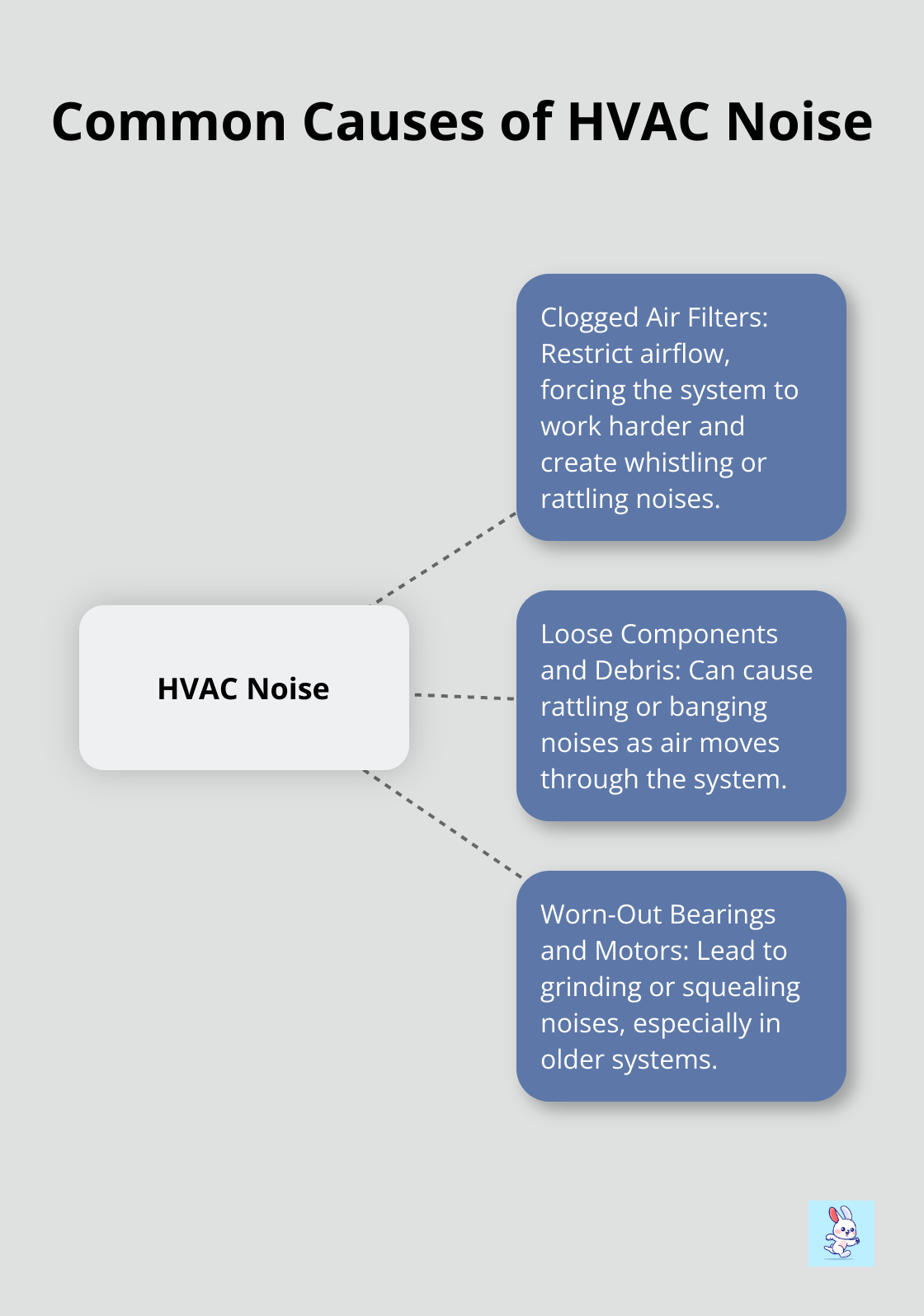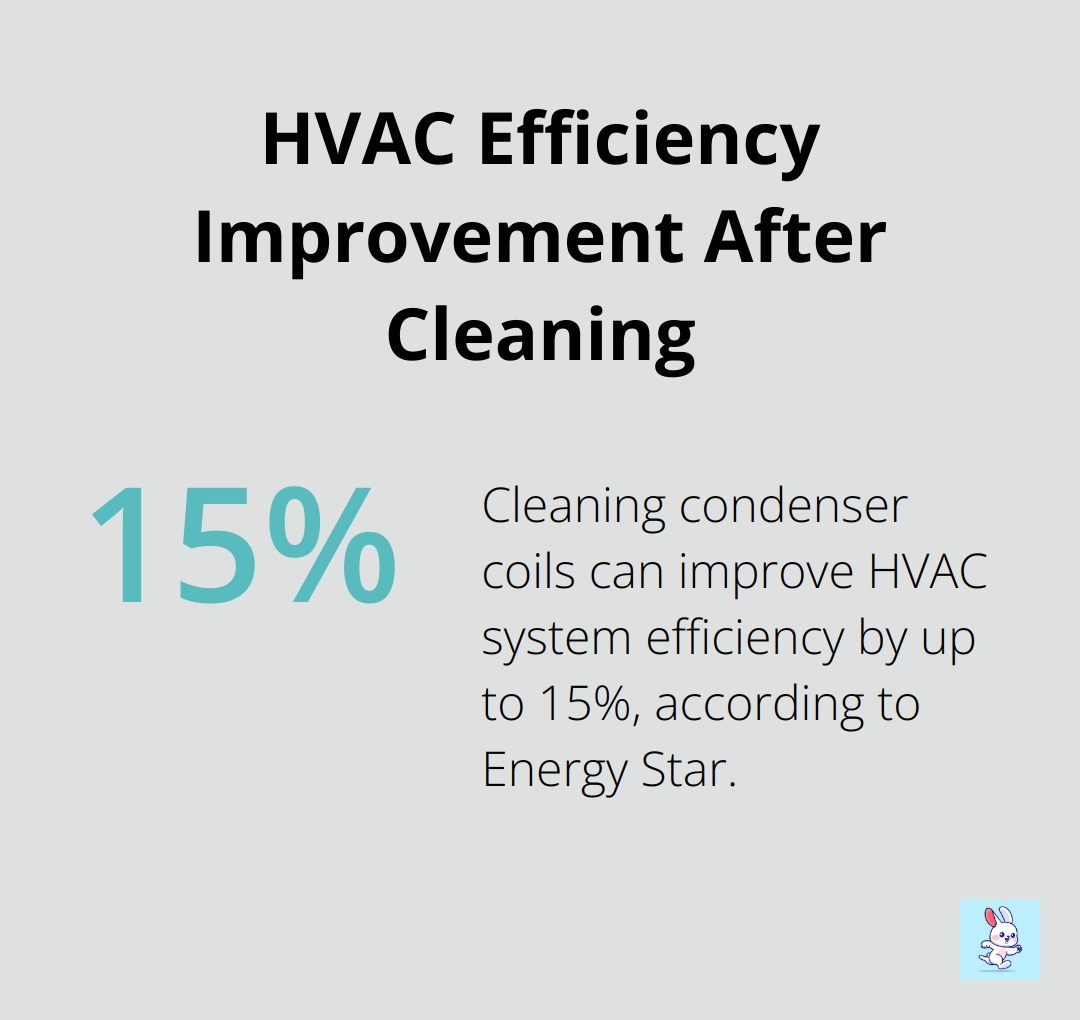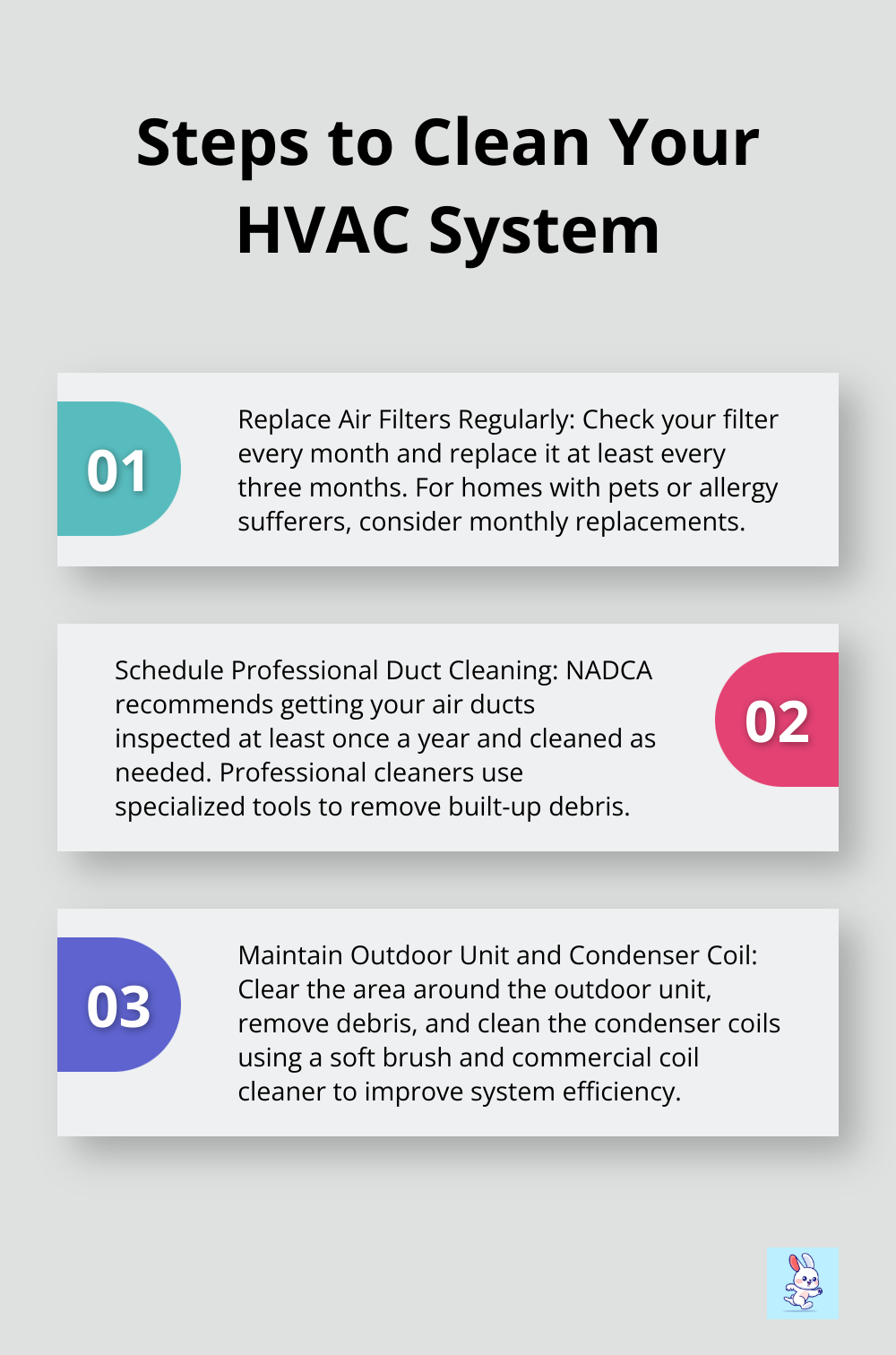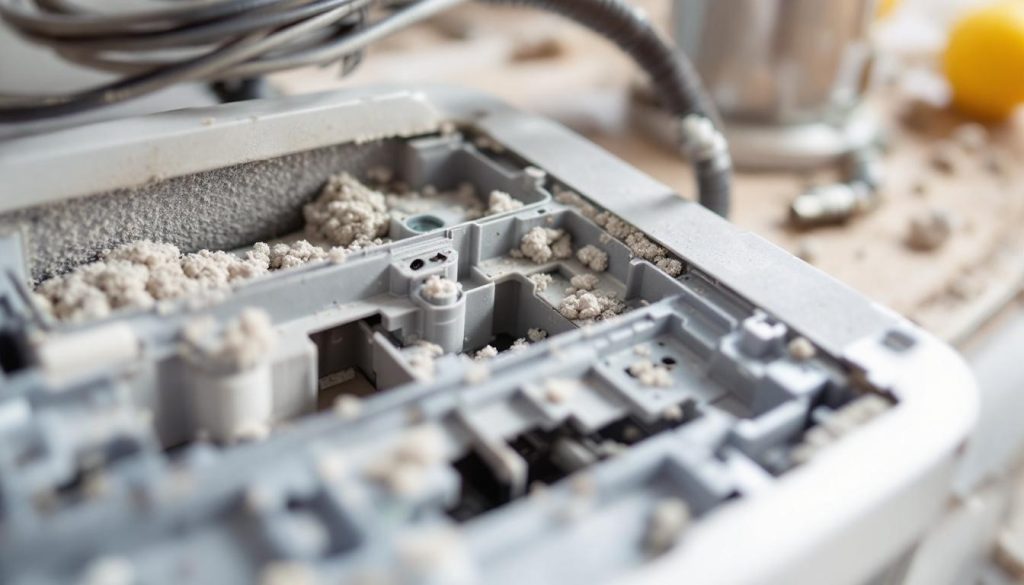Is your HVAC system making strange noises? You’re not alone. Many homeowners struggle with noisy heating and cooling systems, disrupting their peace and quiet.
At Cleaning Rabbit, we’ve found that HVAC noise reduction often starts with a thorough cleaning. Dust, debris, and worn-out parts can all contribute to unwanted sounds, but regular maintenance can help silence these issues.
What’s Making Your HVAC System Noisy?
Noisy HVAC systems often indicate underlying issues that require attention. Let’s explore the common culprits behind these disruptive sounds and how cleaning addresses these issues.

Clogged Air Filters: The Silent Culprit
One of the most frequent causes of HVAC noise is dirty air filters. When filters become clogged with dust and debris, they restrict airflow, which forces your system to work harder. This increased strain can lead to a variety of noises, from whistling to rattling. Replacing or cleaning your air conditioner filters regularly is crucial. Dirty, clogged filters reduce airflow and system efficiency.
Loose Components and Debris: A Rattling Symphony
Over time, HVAC components can become loose due to regular use and vibrations. These loose parts often create rattling or banging noises. Similarly, debris that finds its way into your ductwork can cause a range of sounds as air moves through the system.
Worn-Out Bearings and Motors: The Grinding Chorus
As HVAC systems age, bearings in motors and fans can wear out, which leads to grinding or squealing noises. The Air Conditioning Contractors of America (ACCA) emphasizes that regular lubrication and maintenance of these components can prevent such noises and extend the life of your system.
The Impact of Regular Cleaning and Maintenance
Regular cleaning and maintenance are key to addressing these noise issues. A clean and well-maintained HVAC system operates more quietly and efficiently. If you experience persistent HVAC noises, it’s time to consider a professional cleaning and inspection.
Professional cleaning services use specialized equipment to ensure thorough cleaning without introducing new contaminants into your system. This approach not only reduces noise but also improves overall air quality in your home.
Now that we understand the common causes of HVAC noise, let’s explore how specific cleaning methods can effectively address these issues and restore peace to your home.
How Cleaning Silences Your HVAC
Dust and Debris: The Hidden Noise Culprits
Dust, leaves and other debris can accumulate in your HVAC system, leading to blockages and disrupting airflow. This can cause the system to make various noises. Air movement through dirty ducts or over dusty components creates turbulence, which leads to whistling, rattling, or humming sounds. A thorough cleaning eliminates these particles, allowing air to flow freely and quietly through your system.
The U.S. Department of Energy reports that a significant percentage of HVAC efficiency loss stems from dirt and dust buildup. Removal of this buildup not only reduces noise but also improves your system’s efficiency (potentially lowering your energy bills).
Airflow: The Foundation of Quiet Operation
Improved airflow is essential for quiet HVAC operation. Restricted airflow due to dirty filters or clogged ducts forces your system to work harder, often resulting in increased noise. The frequency of cleaning depends on several factors such as whether or not there are smokers in the household, residents who suffer from allergies, and other considerations.
Professional cleaning services use HEPA-filtered equipment to thoroughly clean ducts and components, ensuring unrestricted airflow throughout your system. This approach not only reduces noise but also improves air quality in your home.

Reducing Strain: A Path to Quieter, Longer-Lasting Systems
Clean HVAC components experience less strain, which translates to quieter operation and a longer lifespan for your system. When parts are free from dust and debris, they don’t have to work as hard to maintain your desired temperature. This reduced strain means less wear and tear, fewer breakdowns, and ultimately, a quieter system.
The Air Conditioning Contractors of America (ACCA) emphasizes that regular cleaning and maintenance can significantly extend the life of your HVAC system while keeping noise levels down.
Identifying Minor Issues: Prevention is Key
Regular cleaning allows for the identification and resolution of minor issues before they escalate into major problems. Small loose parts or minor debris can create annoying noises that, if left unchecked, may lead to more serious (and louder) issues. Professional cleaning services can spot these potential problems early, saving you from costly repairs and prolonged noise disturbances.
Now that we understand how cleaning addresses HVAC noise issues, let’s explore the specific steps you can take to clean your system effectively and maintain its quiet operation.
How to Clean Your HVAC System
Replace Air Filters Regularly
The simplest yet most effective step in HVAC maintenance is to replace air filters. The U.S. Department of Energy recommends that you check your filter every month, especially during heavy use seasons. You should replace it at least every three months. For homes with pets or allergy sufferers, monthly replacements are ideal. This simple task can significantly reduce strain on your system, lower noise levels, and improve efficiency.

Professional Duct Cleaning: A Necessity
While some homeowners attempt DIY duct cleaning, professional services yield superior results. NADCA recommends getting your air ducts inspected at least once a year, and cleaned as needed. However, homes with pets, smokers, or recent renovations may require more frequent cleaning. Professional cleaners use specialized tools to remove built-up debris, which reduces noise and improves air quality.
Outdoor Unit and Condenser Coil Maintenance
Your HVAC’s outdoor unit needs attention too. Clear the area around the unit, and remove leaves, twigs, and debris. Before cleaning air conditioner fins, shut off the air conditioner at the thermostat and locate the power supply box next to the outdoor condenser unit. For condenser coils, use a soft brush and a commercial coil cleaner. This maintenance not only reduces noise but also improves system efficiency by up to 15% (according to Energy Star).
Schedule Annual Professional Check-ups
While regular DIY maintenance is important, nothing beats a professional annual check-up. HVAC technicians can spot potential issues before they become noisy problems. They will lubricate moving parts, tighten loose components, and ensure your system operates at peak efficiency. The Air Conditioning Contractors of America (ACCA) emphasizes that these check-ups can extend your system’s lifespan and maintain quiet operation.
Professional HVAC cleaning services address all these aspects. They use HEPA-filtered equipment to ensure thorough cleaning without introducing new contaminants. Try to find a service that treats your home as if it were their own, providing honest service without hidden fees.
A clean HVAC system is a quiet HVAC system. Regular maintenance not only reduces noise but also improves air quality and system efficiency. You can enjoy a peaceful, efficiently cooled home year-round if you follow these steps and partner with professionals.
Final Thoughts
A noisy HVAC system disrupts your home’s peace, but proper cleaning and maintenance offer effective solutions. Regular cleaning removes accumulated dust and debris, improves airflow, and reduces strain on system components. Professional cleaning services provide comprehensive HVAC noise reduction solutions using advanced equipment.
At Cleaning Rabbit, we specialize in thorough HVAC cleaning for residential and commercial properties. Our team uses HEPA-filtered equipment to ensure your system operates quietly and efficiently. We treat your home with respect and provide honest service without hidden fees.
A quiet HVAC system indicates a well-maintained home. Professional cleaning improves air quality, energy efficiency, and overall comfort (while reducing noise). Take action today to silence disruptive HVAC noises and enjoy a peaceful, efficiently cooled home year-round.

